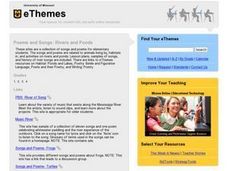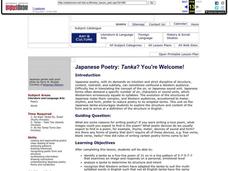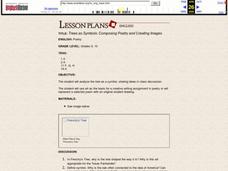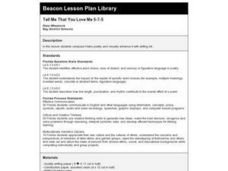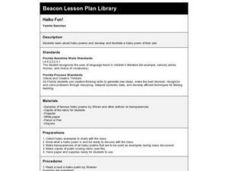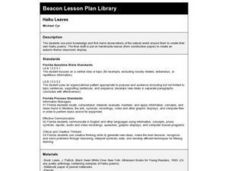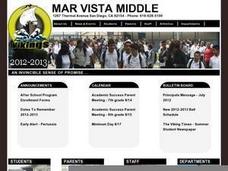Curated OER
Poetry to the Core
Second graders examine several examples of poetry in the six lessons of this unit. The lessons focus on five poetic forms, couplets, quatrains, limericks, Haiku, and free verse.
Curated OER
Poems and Songs: Rivers and Ponds
Pupils explore songs and poems related to the animals, habitats, and activities on rivers and ponds. They listen to song clips, explore various websites, read poems and song lyrics, complete worksheets, and define key vocabulary words.
Curated OER
Unrhythmic, Culturally Diverse, Simple Forms of Poetry
Students write an example of each of the three poetry styles (haiku, cinquain, and diamante) and they see that not all poetry rhymes.
Curated OER
Japanese Poetry: Tanka? You're Welcome!
Students explore the structure and content of the Tanka form and to arrive at a definition of the structure in English. They analyze a tanka to determine its structure and intent and compose two Tanka; one in traditional form and one...
Curated OER
Show Don't Tell
Students review the Show Don't Tell method of writing haiku poetry. They practice distinguishing poetic language from academic language and create poems based on images, not explanations.
Curated OER
Haiku Lessons With Feeling
Haiku, a form of Japanese poetry, can provide a way for students to tap into their creative abilities.
Curated OER
Two Haiku
Eighth graders, in pairs, discuss what they already know about Haiku poetry. They try to remember the rules, history, and focus of traditional Japanese Haiku. they read more examples of Haiku and then write and illustrate their own...
Curated OER
Personalized Poetry Portfolio
Eighth graders create their own poetry portfolio containing poems that relate to Students' lives and families. The portfolio consist of the following types of poems: acrostic, diamante`, haiku, cinquain, and free verse.
Curated OER
Poetry Pop-Up
Third graders, after exploring the process of writing poetry through imagery words that go beyond pen and paper, create a Poetry Pop-Up Book. They incorporate the use of the Thesaurus and clip-art/digital photography to assist them in...
Curated OER
Raptor Poetry
Students create poems about raptors. They discuss raptors and create three poems including at least two of the following: haiku, diamante, found, and acrostic. They create a classroom book of poems or conduct a poetry slam where students...
Curated OER
The Relationship Between Zen And Haiku Aesthetics
Students examine the principles of Haiku as they relate to idealss found in Zen Buddhism in this High School lesson. The lesson concludes with the creation of individual haikus by each student.
Curated OER
Five Simple Poems
Students listen as the teacher explains what poetry is as well as describes several types of poetry such as haiku, free verse, limerick, cinquain, and an acrostic. Students read examples of each type of poetry. They compose a poem...
Curated OER
Trees as Symbols: Composing Poetry and Creating Images
Students analyze the tree as a symbol, sharing ideas in class discussion. They use art as the basis for a creative writing assignment in poetry or represent a selected poem with an original student drawing.
Curated OER
Cinquain Poems
Students write five-line, diamond shaped poems that are very easy to write then submit one through an automatic PIZZAZZ form.
Curated OER
Tell Me That You Love Me 5-7-5
Students listen to several examples of Haiku poetry and discuss the strict format. Then students create and edit their own Haiku poems and enhance them with ink designs.
Curated OER
Haiku, Limerick, Acrostic
Young scholars brainstorm about favorite types of movies and why they are liked. They investigate different types of poetry from examples given in class. Using the examples they attempt to generate their own poems.
.
Curated OER
Haiku Leaves
Fifth graders create their own Haiku poem about something they saw on a trip outdoors. They write it on a handmade leaf which is used to create an autumn display in the classroom.
Curated OER
Periodic Poetry
Students review periodic table of elements, choose one element, and create piece of poetry about it using Cinquain, Haiku, or Acrostic format. Students then read aloud their poems to classmates.
Curated OER
A Selection of Mexican Art
Seventh graders participate in a supplemental lesson designed for McDougal Littell's Text "The Language of Literature". They view Mexican artwork by Frida Kahlo and Diego Rivera and complete an art viewing guide. Afterwards, they write a...
Curated OER
Poetry Anthology of Basic Forms
Pupils explore the format of the following poetic forms: acrostic, haiku, cinquain, diamente, and free-verse.They create a handbook or anthology of these poetic forms, with at least one sample of original work in each format.
Curated OER
The Power of Poetry
Students utilize the Internet to research figures of speech used in poetry and poetry terms
Curated OER
Writing
Students practice word processing skills while writing Haiku and diamonte poems. For this poetry computer lesson, students choose from a group of rainforest animals and write about their animal. Students write a narrative story. ...



